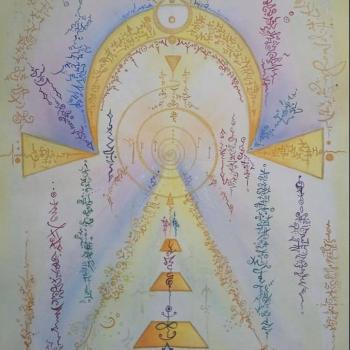Walking in the Valley Lenten Series #1, 3/12/2011
Text: Psalm 42
Last week, we talked about being on the mountaintop with Jesus. Now, during Lent, we will be walking with Him through the valley to the cross. There are many aspects to the journey that Christ took to the place called Calvary where he was crucified – he dealt with pain, fear, betrayal, saying goodbye to loved ones, feeling like His own Father had abandoned Him. This first week, we will be talking about pain. I wanted to share a psalm that speaks about this journey of pain. Some of you might be familiar with Psalm 42 because it’s been made into a very beautiful hymn. But despite the beauty of the hymn, it is first and foremost a psalm about walking in pain. As a project in my Hebrew poetry class a year ago, I wrote my own translation of this psalm so here it is:
Like a deer longs for gushing water, so my soul longs for you, O God. My soul thirsts for God, for the living God – When will I enter, and be seen by the face of God? My tears have been my food day and night while I hear all day long: “Where is your God?” These things let me remember and pour before me, O my soul: how I used to rush through the multitude, marching to the house of God, with their ringing cries and songs of thanksgiving – the pandemonium of a great festival. Why do you melt, O my soul, and stir disquiet within me? Hope in God, for yet again I will praise the one whose face is salvation – My God!
My soul melts within me; therefore I will remember You from the land of the Jordan and the Great Mountain, from this humble hill. Deep calls to deep in the thunder of your waterfall, as it crashes and sweeps over me. By day, the Lord will direct His goodness, so that by night, His song will stay with me, a prayer to my living God. Let me say to God, my Rock: “Why have you forgotten me? Why do I walk in darkness while my enemy oppresses me?” In the splitting of my bones, my enemies taunt me, saying all day long, “Where is your God?” Why do you melt, O my soul and stir disquiet within me? Hope in God, for yet again I will praise the one whose face is salvation – My God!
In our journey of coming to know God, pain is an enemy that taunts us, especially when it’s pain that doesn’t make any sense. If I go to the gym and feel pain, then I can make sense of it. I can say this hurts and that means progress. But what about pain that just is, that doesn’t have a purpose or even a diagnosis? My mother suffers from something called fibromyalgia. It causes her joints to ache like she has the flu. She never sleeps well at night, which only makes it worse during the daytime. It’s hard to make pain like that fit into how we understand God’s plan for our lives. Pain like that is an enemy that mocks us, saying, “Where is your God?” If your God loves you, then how do you explain me, your pain?
We don’t know the exact nature of the pain that the psalmist describes in this poem, whether the “splitting of the bones” is literal or symbolic. What we do know is that this pain was real enough for the psalmist to feel forgotten by God. She remembers a time when she could rush through the multitudes rejoicing on their way to the house of God. But now her bones are splitting inside of her; now her soul is melting. The Hebrew word for soul is nefesh, which literally means “throat,” or the breath within our throats that means we’re alive. A breath that is melting is a throat that has been dried out by suffering. The reason this psalmist is longing for God like a deer longs for water is because she has no water left in her throat. She is struggling even to breathe. Her tears have become her food.
But despite this desperate condition, the psalmist has decided that all will be well if she can just see the face of God. I think it’s important to name the fact that having a faith like that is an act of rebellion. The psalmist does not give reasons to justify her hope in God; in fact she gives all the reasons why it makes no sense to hope in God and why it seems like God has forgotten her. But she rebels against these reasons as her bones split, as her pain taunts her, and she decides that as long as she has a breath, she will use it to defy her pain and, despite the fact that it makes no sense, declare her hope in God and praise the One whose face is salvation.
What keeps the psalmist alive is her quest to see the face of God, but what does this really mean? The Jewish philosopher Emmanuel Levinas talks about the difficulty of truly seeing the face of another person. We think it’s pretty straightforward to look at someone else’s face. But in the world, we all wear masks, and it’s hard to see the face beneath the mask. When we look at other people, we see what they think they’re supposed to show us, whatever part the world has taught them to play. Most of us have shown our true faces to very few people if any, because to show your face to another person leaves you vulnerable to teasing, criticism, or even betrayal. So can you imagine standing face to face with God Himself, knowing that you would see in His eyes the knowledge of every shameful thing you have ever thought or done? Most ancient people were so terrified by this thought that they assumed nobody could see the face of God and live. And yet the hope that carries the psalmist through her pain is the thought of seeing God face to face.
As Christians, we believe that God has shown the world His true face through Jesus Christ. As Jesus tells His disciples in John 14, “Whoever has seen me has seen the Father.” But we don’t see God’s face fully in Jesus’ teachings or even His miracles. His powers might impress us and His teaching might be profound, but these alone would not take away the terror of facing the judge of the universe. None of what Jesus did would make God’s face any less threatening without the pain that He suffered on the cross. But the cross proves that God was not willing to sit back on His throne and frown at us from a distance; He was so moved by our pain and the loneliness we feel behind our many masks, that He could not hold Himself back from coming into our world in the form of Jesus and suffering with us. That’s literally what the word compassion means – to suffer with. Jesus made Himself the most completely vulnerable that He could have to the point of being nailed naked to a cross and suffering the most pain He possibly could have, all so that we would stop being afraid to take off our masks and see the face of God.
Jesus’ strategy for saving the world is pretty bizarre – to come to Earth and be helpless. That approach makes no sense to worldly wisdom, which is built upon solutions and explanations and efficiency. But what Jesus models for us on the cross is actually the best way to respond to the pain of people we love. When you’re in pain, you do need helpful people who come along in their lab coats bringing helpful things like ice chips or morphine drips and giving you helpful things to do like pills to take and exercises to perform. But what your soul really needs when it’s melting away and you feel like a desperate deer with splitting bones and a dry throat is someone to be helpless with you. It’s difficult to learn how not to be helpful when you’re with people who are suffering, but sharing in their helplessness is the rawest form of companionship that you can provide.
God doesn’t want anyone to live in pain, but those who have experienced the helplessness of deep pain have something important to teach us if we want to learn true compassion – how to suffer with others. The body of Christ is not a place for successful people who have never suffered; the world has plenty of clubs for people like that. We follow a Messiah who chose the helplessness of pain to create a safe place for people who suffer pain to share their helplessness with each other. Somehow it is by standing in this shared helplessness that we see the face of God and prepare ourselves to spend eternity in His loving arms.











